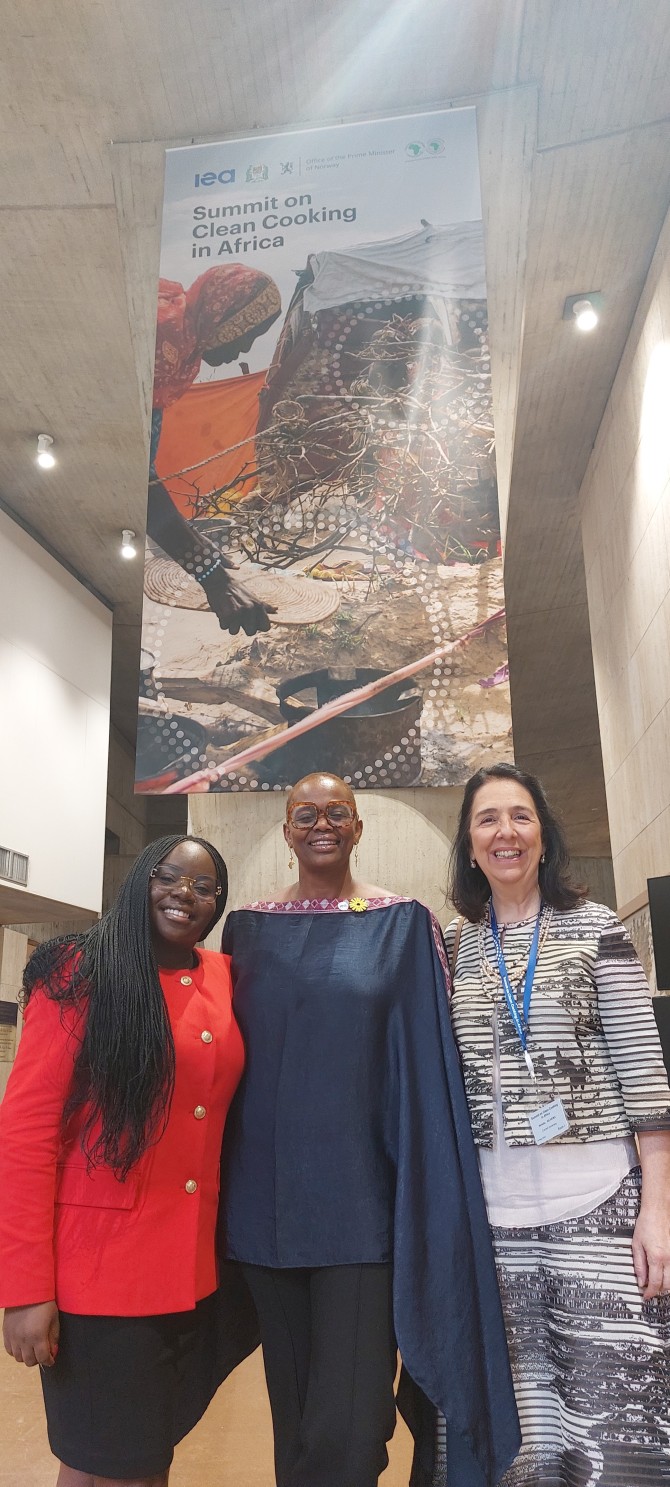
World leaders at the Summit on Clean Cooking in Africa, which was hosted in Paris on May 14, 2024.
News directly from Cornell's colleges and centers
Silveira attends African clean-cooking global summit
By Diane Tessaglia-Hymes
In Africa, 80% of households cook meals over open fires or traditional stoves using polluting fuels such as wood, animal dung, crop waste or charcoal. On May 14, 2024, the International Energy Agency convened the “Summit on Clean Cooking in Africa” at the UNESCO headquarters in Paris to address this problem and secure financial commitments from participating countries and organizations.
The 2024 Summit on Clean Cooking in Africa brought together more than 1,000 high-level global leaders with the goal to make 2024 a turning point for progress on ensuring access to clean cooking for all. One of those invited to attend was Semida Silveira, professor of practice in Systems Engineering and faculty fellow of the Cornell Atkinson Center for Sustainability. She was nominated by the Council of Engineers for the Energy Transition, a global organization of engineers and energy systems experts advising the United Nations secretary general on how to accelerate the energy transition and keep the 1.5-degrees Celsius target alive.
“I think it's quite amazing that we had such a high-level meeting for clean cooking,” said Silveira. “That's something that has never happened. Clean cooking is part of the United Nations Sustainable Development Goals (SDG7), which is about providing affordable, universal access to clean energy by 2030. This goal includes access to clean cooking and is one of the most important goals of the SDG7 because if we don't solve issues of energy access, there are many other goals we cannot solve, such as clean water, food security or even issues related to education.”
According to the International Energy Agency, there are currently 2.3 billion people in the world who do not have access to clean cooking, and nearly 1 billion of those are in Africa. Of concern, the number of people in Africa who do not have access to clean cooking is increasing. In addition to the importance of using clean fuels to combat climate change, clean fuels are also important for health and social reasons. Women and children especially are the ones most affected.
As women cook over open stoves, sometimes indoors, they breathe in carbon monoxide and other harmful gasses. To obtain the fuel for traditional methods of cooking, especially in rural areas, women and children can spend four or more hours per day collecting dung, wood, agricultural waste or whatever is available and burnable to fuel their stove – followed by several hours cooking.
“Emissions from traditional cooking methods are small percentage of the climate problem, but the benefits of bringing clean cooking to the population is greater than just the benefits to the environment,” said Silveira. “In terms of empowering women, the gains are incredible, particularly in the rural areas of Africa: releasing time for women to pursue other activities or other productive goals, and protecting them – and the population – from exposure to gasses that are harmful to health.”
Two of the most-frequently cited barriers to clean cooking are cultural resistance and affordability, and the summit focused on addressing the affordability barrier by raising funds to make clean cooking less expensive: providing subsidies for stoves and increasing liquid petroleum gas availability.
“There are so many advantages to clean cooking, but people cannot afford it,” Silveira said. “That is the main barrier, so I was glad to see the summit address affordability. We have not completely solved that issue, but capital markets are picking up and industries – particularly the oil and gas industry – are looking for opportunities like investing in clean cooking to reduce emissions. Doing so gives them credits, and those credits have value.”
Silveira views the new opportunities for subsidies as a positive change but is concerned about potential pitfalls, such as volatile markets and no access to liquid petroleum gas if subsidies are discontinued. Another disadvantage is that subsidies do not create linkages in the local economy. For example, very few cooking stoves are produced in Africa because it is less expensive to produce them in China. Providing a subsidy to purchase a stove does not create local jobs and a local economy for Africans.
Silveira believes there is an opportunity to use a more creative, systems approach to solving the problem.
“In the rural areas, you have to overcome affordability and you have to change traditional practices,” she said. “If energy costs consume most of the money that impoverished people have, they will prioritize spending their money on something else, especially when traditional fuel is available and free. So that's why we need to think of clean cooking in terms of how to use funds to create the synergies that generate local supply chains.”
Silveira is strong advocate for biogas, which can be produced from dung, agricultural waste or any kind of bio-organic residue, and wrote a briefing for the Council of Engineers for the Energy Transition on how biogas – a sustainable solution for clean cooking – could also create synergies with the local economy. For example, if enough biogas is produced, it can be used to power turbines and produce electricity, creating opportunities and synergies with agri-food industries.
“Currently, the discussion on clean cooking is about energy security,” said Silveira. “But we are starting to talk more about ways to combine clean cooking with other aspects of the economy, such as agriculture. The communities have agriculture, and they have residues of agriculture. If they can produce their own biogas fuel using agricultural residue, this will create a positive cycle that can scale up.”
Silveira added: “I think the time is ripe for a more complex solution.“
Media Contact
Get Cornell news delivered right to your inbox.
Subscribe

